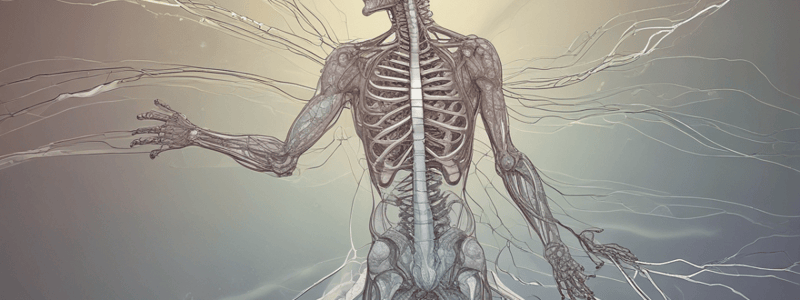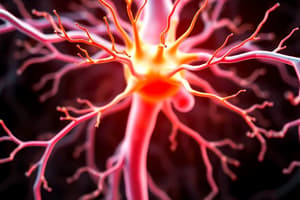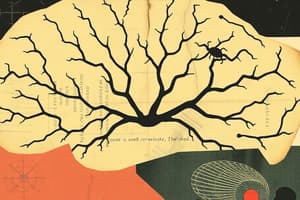Podcast
Questions and Answers
Which of the following neurotransmitters is involved in reward-motivated behavior, motor control, and emotional responses?
Which of the following neurotransmitters is involved in reward-motivated behavior, motor control, and emotional responses?
- Glycine
- Glutamate
- Dopamine (correct)
- Serotonin
Adenosine is primarily known for its excitatory effects in the CNS.
Adenosine is primarily known for its excitatory effects in the CNS.
False (B)
What are the three main categories of neurotransmitters found in the CNS?
What are the three main categories of neurotransmitters found in the CNS?
Monoamines, Amino Acids, and Purines
The _______________ nervous system neurotransmitters also play roles in the CNS, though their primary functions are in the peripheral nervous system.
The _______________ nervous system neurotransmitters also play roles in the CNS, though their primary functions are in the peripheral nervous system.
Which of the following is the main inhibitory neurotransmitter that reduces neuronal excitability?
Which of the following is the main inhibitory neurotransmitter that reduces neuronal excitability?
Match the following neurotransmitters with their primary functions:
Match the following neurotransmitters with their primary functions:
Epinephrine is primarily involved in the fight-or-flight response and arousal.
Epinephrine is primarily involved in the fight-or-flight response and arousal.
What are the endogenous peptides that bind to opioid receptors, modulating pain perception, mood, and reward?
What are the endogenous peptides that bind to opioid receptors, modulating pain perception, mood, and reward?
What is the primary target of medications available for Alzheimer's disease (AD)?
What is the primary target of medications available for Alzheimer's disease (AD)?
Alzheimer's disease is a reversible condition.
Alzheimer's disease is a reversible condition.
What is the primary focus of ongoing research efforts for Alzheimer's disease?
What is the primary focus of ongoing research efforts for Alzheimer's disease?
Donepezil, a cholinesterase inhibitor, is primarily used in the treatment of _________________.
Donepezil, a cholinesterase inhibitor, is primarily used in the treatment of _________________.
Match the following symptoms with their corresponding stages of Alzheimer's disease:
Match the following symptoms with their corresponding stages of Alzheimer's disease:
Donepezil is approved by the FDA for managing mild, moderate, and severe symptoms of Alzheimer's disease.
Donepezil is approved by the FDA for managing mild, moderate, and severe symptoms of Alzheimer's disease.
What is essential for healthcare professionals involved in the care and management of patients with Alzheimer's disease?
What is essential for healthcare professionals involved in the care and management of patients with Alzheimer's disease?
What is the primary goal of supportive care for patients with Alzheimer's disease?
What is the primary goal of supportive care for patients with Alzheimer's disease?
What is the recommended initial dosage of donepezil to minimize side effects?
What is the recommended initial dosage of donepezil to minimize side effects?
Donepezil can cure Alzheimer's disease.
Donepezil can cure Alzheimer's disease.
What is the importance of taking donepezil regularly as prescribed?
What is the importance of taking donepezil regularly as prescribed?
Donepezil is administered orally, preferably in the ______ with or without food, to reduce the risk of adverse effects like nausea.
Donepezil is administered orally, preferably in the ______ with or without food, to reduce the risk of adverse effects like nausea.
What is the category of cholinergic effects that includes bradycardia (decreased heart rate due to increased parasympathetic tone)?
What is the category of cholinergic effects that includes bradycardia (decreased heart rate due to increased parasympathetic tone)?
Donepezil can stop disease progression in Alzheimer's disease.
Donepezil can stop disease progression in Alzheimer's disease.
Match the following cholinergic effects with their corresponding physiological responses:
Match the following cholinergic effects with their corresponding physiological responses:
What is the importance of regular follow-up with healthcare providers for patients taking donepezil?
What is the importance of regular follow-up with healthcare providers for patients taking donepezil?
Flashcards are hidden until you start studying
Study Notes
Central Nervous System
- Composed of brain and spinal cord, processes and integrates sensory information, coordinates voluntary movements, and regulates physiological functions
- Neurotransmitters transmit signals across synapses between neurons, allowing for communication within the brain and spinal cord
Neurotransmitters in the CNS
- Peripheral Nervous System Neurotransmitters:
- Epinephrine
- Norepinephrine
- Acetylcholine
- Monoamines:
- Dopamine: involved in reward-motivated behavior, motor control, and emotional responses
- Epinephrine (Adrenaline): involved in fight-or-flight response and arousal
- Norepinephrine (Noradrenaline): involved in arousal, stress responses, and attention
- Serotonin (5-HT): regulates mood, emotion, sleep, and appetite
- Amino Acids:
- Aspartate: excitatory neurotransmitter involved in synaptic transmission
- Gamma-Aminobutyric Acid (GABA): main inhibitory neurotransmitter that reduces neuronal excitability
- Glutamate: main excitatory neurotransmitter involved in synaptic plasticity and learning
- Glycine: inhibitory neurotransmitter in the spinal cord and brainstem
- Purines:
- Adenosine: modulates synaptic plasticity, sleep, and arousal
- Opioid Peptides:
- Dynorphins, Endorphins, Enkephalins: endogenous peptides that bind to opioid receptors, modulating pain perception, mood, and reward
Alzheimer's Disease
- Leads to aphasia (difficulty with language) in advanced stages
- Affects motor skills, leading to difficulties with coordination, balance, and eventually, immobility in later stages
- Current therapies aim to alleviate symptoms by targeting neurotransmitter imbalances
- Research efforts focus on understanding underlying mechanisms to develop disease-modifying treatments
- Patient education:
- Prognosis: AD is irreversible and progressive
- Supportive care: caregiver support, safety measures, and adaptation of living environments are crucial for managing AD symptoms and improving quality of life
Donepezil (Aricept) for Alzheimer's Disease
- Cholinesterase inhibitor used to treat mild, moderate, and severe symptoms of AD
- Dosage and administration:
- Initiation: 5 mg once daily
- Titration: may be increased to 10 mg once daily after 4-6 weeks
- High dose: 23 mg extended-release tablet for patients with moderate to severe AD
- Patient education:
- Expectations: donepezil can improve symptoms temporarily, but does not cure AD nor stop disease progression
- Adherence: take donepezil regularly as prescribed to maintain therapeutic benefits
- Monitoring: regular follow-up with healthcare providers is necessary to monitor for side effects and adjust dosages if needed
Studying That Suits You
Use AI to generate personalized quizzes and flashcards to suit your learning preferences.




